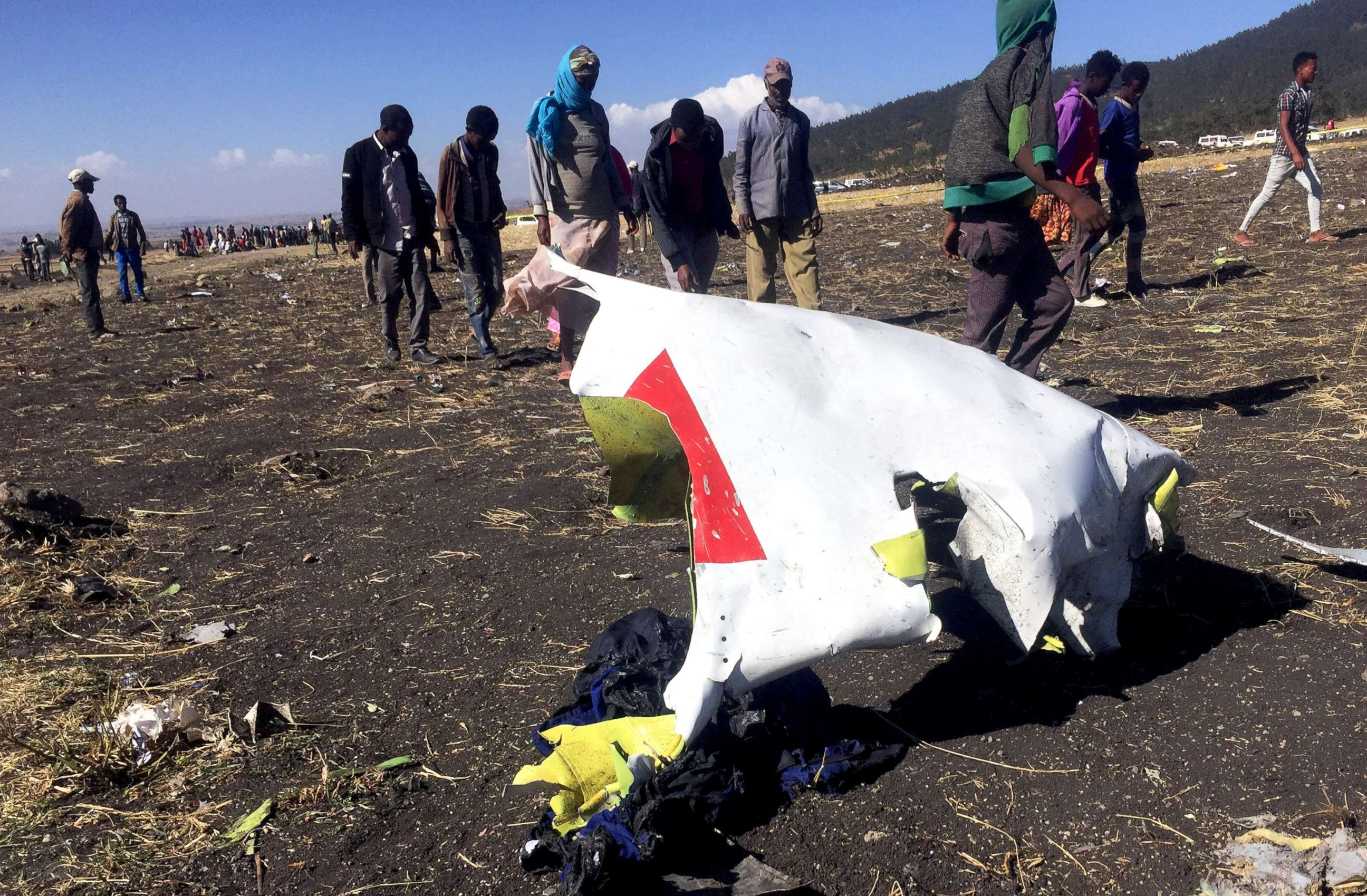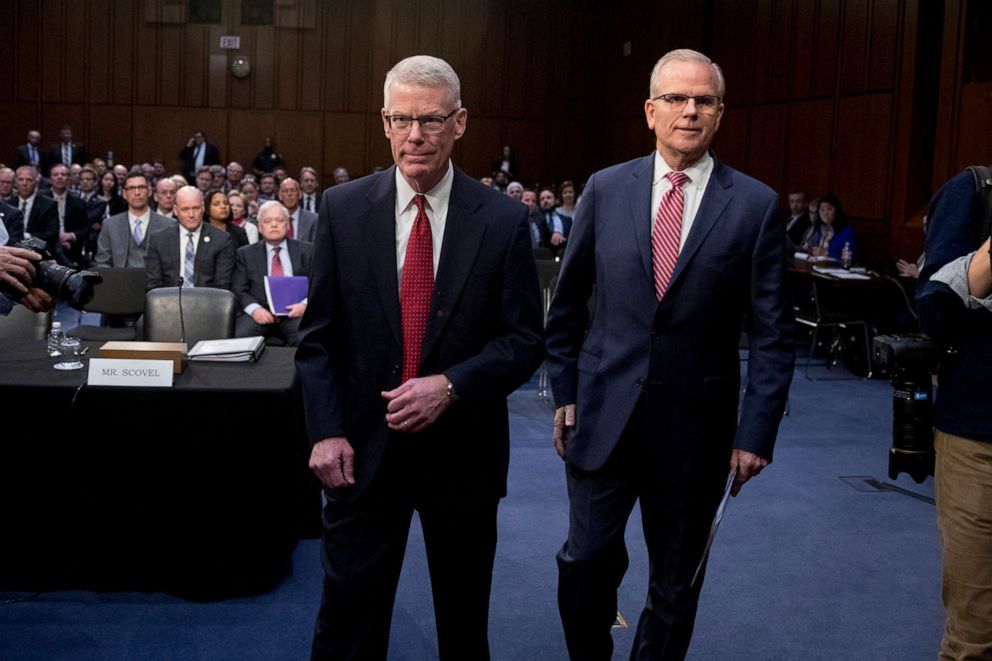Boeing reveals proposed updates to 737 MAX amid scrutiny of automated safety system
The software updates would improve the system by using more data points.
After two crashes of Boeing 737 MAX aircraft in five months raised questions around the world about the safety of the world's best selling commercial airplane, Boeing revealed updates to a scrutinized automated safety system in the new model on Wednesday while defending the original design, saying the software updates would make the design "more robust."
In a briefing with reporters on Wednesday, Boeing said the highly anticipated changes would most importantly prompt the aircraft to utilize two sensors instead of just one to engage the MCAS, or Maneuvering Characteristics Augmentation System, designed to compensate for larger engines placed further forward on the wings of the MAX model, a new generation of the Boeing 737. Such a malfunction is believed to have been at play in the Lion Air crash after a sensor was poorly maintained. That accident killed 189 people on board.
The system is designed to automatically drop the nose of the aircraft if sensors mounted on the nose of the aircraft detect the plane potentially entering a stall, a dangerous situation for an aircraft at low altitude. Under the proposed updates, which need FAA approval before they are offered to the airlines, if the two sensors judge a difference of more than 5 degrees between the two of them, the MCAS is disabled for the remainder of the flight.
Additionally, the updates will limit the safety system to only push the nose of the plane down once per improper angle of attack sensed by the aircraft. The pilots will also be able to override the automatic inputs with the control column.
Mike Sinnett, VP of product strategy for Boeing, reiterated that in the event of an MCAS malfunction, MAX pilots have always been able to disable the system with a switch under their thumb or by manually trimming the aircraft through the trim wheel.

"The 737 is a safe airplane," Sinnett said. "The 737 family is a safe airplane family. The 737 MAX builds on that tremendous history of safety that we've seen for the last almost 50 years."
Federal aviation officials expect the software update -- which was designed by Boeing based off findings from October's Lion Air crash in Indonesia -- will be approved by the Federal Aviation Administration in the coming days.
After the software update is approved, it would take about a day to deploy and an hour to upgrade each aircraft. Boeing will also provide training for pilots on the changes that a Boeing official told reporters on Wednesday would consist of only a half hour of computer training with no time in the simulator necessary, allowing for quick implementation for the airlines.

The United States Federal Aviation Administration was among the last in the world to ground Boeing 737 MAX passenger flights after regulators around the world one-by-one banned the aircraft from their airspace shortly after the Ethiopian Airlines crash.
On March 13, when the FAA said it received more robust satellite data showing similarities in the flight path, the agency grounded the aircraft. But public outcry had already reached a fever pitch, with some accusing the airline of going too far to defend the American aircraft manufacturer.
In a hearing in front of a Senate subcommittee on aviation safety in Washington, D.C., on Wednesday, FAA Acting Administrator Daniel Elwell defended that decision saying his agency was the first to make a decision on the grounding with refined data.
"We may have been -- I think someone said -- the last country to ground the aircraft, but the United States and Canada were the first countries to ground the aircraft with data for cause and purpose," Elwell said. "And that's important because when you ground a fleet of aircraft for a reason, a definable reason, then you have something by which to un-ground them when you've mitigated that or you've solved it or you've found that link."
Sen. Ed Markey, D-Mass., went after Elwell regarding Boeing charging extra for certain safety features on their aircraft.
"From my perspective, safety should never be à la carte, safety should never be optional, safety should always be mandatory," Markey said.
Markey repeatedly pressed Elwell on whether the FAA should stop airplane manufactures from offering some safety features as options as opposed to built-in requirements, relating these features to seat belts and airbags in cars.
Elwell responded that all "safety-critical" features are already mandatory.
"Senator Markey I will tell you that if there is any manufacturer that sells a safety-critical part à la carte we will not permit it," Elwell said.
It remains unclear what caused the Ethiopian Airlines crash in March, which killed 157 people, but investigators have revealed that data from the black boxes reflect similarities between the two crashes.
“Every time something happens we learn from it,” a Boeing official said, on the condition of anonymity. “We do not know the ultimate cause of the accidents. MCAS is just one independent link in the chain. We can make that more robust.”
“As tragic as this is — and these two accidents are terribly tragic, and we understand the gravity of that — we do learn from it,” Boeing said.




